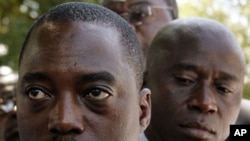A showdown is looming in the capital of the Democratic Republic of Congo, where opposition leader Etienne Tshisekedi says he will swear himself him as president Friday, even though the controversially re-elected President Joseph Kabila began his new term in office Tuesday.
Despite many invitations, Zimbabwe's President Robert Mugabe was one of the few dignitaries at the presidential compound in Kinshasa Tuesday as Joseph Kabila took the oath of office for a new five-year term.
During his speech, Kabila promised to safeguard national unity, create more jobs, build power plants, boost agricultural production and revise mining deals.
But, Friday, Tshisekedi says he will get sworn in at at his own inauguration ceremony at the capital's Stade des Martyrs - in English, the stadium of the martyrs. The former prime minister has called on heavily deployed security forces and confused civil servants to take orders from him. Tshisekedi says he is the rightful winner of the fraud-marred November presidential poll.
Official results placed him second, with about 32 percent of the vote to Kabila's near 49 percent in the crowded one-round contest. Observers from the U.S-based Carter Center said the vote was so flawed it lacked credibility. Problems which were reported included impossibly high turnouts in some areas, ballot stuffing in others and chaotic vote counting overall.
Laura Seay, a U.S.-based Congo expert working on a book about the weakness of the Congolese government in the country's war-wracked east, is afraid of what might soon happen in the western capital Kinshasa.
"People have been prohibited from participating in most peaceful protests so when people are not able to protest peacefully, we know in other situations, often times, they feel they have no choice but to turn to violence," said Seay. "So that is the major concern right now is that you will see a turn to violence or a violent response by the government security forces."
Tshisekedi has also called for Kabila's capture. Despite such statements, Seay does not believe Kabila's government will arrest him now.
"They do know that he does have this strong base of support and that something like that would provoke Kinois [residents of Kinshasa] certainly and people in other parts of Congo to take to the streets and protest," she said.
With less than a third of votes counted from the parliamentary election which also took place in late November, Seay says there is still a possibility parties who support Tshisekedi could gain control of parliament and seek to have him return as prime minister.
Concerning the presidential poll, Seay would like to see what she calls a rapid technical review of the vote with credible international observers.
Monique Beadle, the advocacy director for a U.S. group promoting peace in the Democratic Republic of Congo, called Falling Whistles, says she finds it very frustrating many Congolese no longer believe in the electoral process, after decades of authoritarian rule and conflict.
"They are talking about not participating in future elections, and really that is a huge step backward for the fledgling democracy that DRC is," said Beadle. "And we were hoping that these elections would make people really excited to participate in democracy."
Her organization had been working with the Congolese radio station Mutaani FM to monitor the vote process with text messages, but text messaging was shut down by all providers shortly after voting ended.
Beadle says election day accounts she received from parts of the eastern North Kivu province concerning Kabila supporters were very disturbing, and do not bode well for the coming days.
"They were pulling people from their homes, confiscating their voter registration cards, voting in their place, sometimes up to a dozen times," she said.
A U.S-based activist who does not believe Kabila won is Kambale Musavuli, the spokesman for the group "Friends of the Congo".
Musavuli is helping organize protests this Friday outside the Democratic Republic of Congo, including Washington and New York, to coincide with Tshisekedi's planned action.
"There needs to be a respect for democracy in the Congo, for human rights and the will of the Congolese people, so this is a symbolic march and protest in solidarity with the people inside of the Congo," said Musavuli. "And the Congolese on the outside are also mobilizing for the same cause."
Kabila first came to power in 2001 shortly after his father, former rebel leader turned president Laurent Desire Kabila, was assassinated.
In the 2006 elections, which the United Nations helped organize and which Tshisekedi boycotted over concerns of fraud, Kabila defeated former rebel leader Jean-Pierre Bemba in a second round run-off. Bemba is now being tried for war crimes at the International Criminal Court in the Hague.
With Dueling Inaugurations, Political Showdown Looms in DRC











